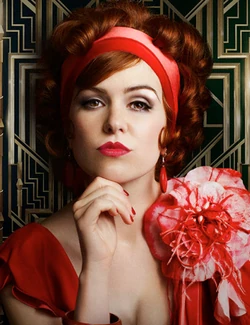
| |
| Myrtle Wilson | |
| Portrayed by | Georgia Hale Shelley Winters |
| Biographical information | |
| Status | Dead |
| Residence | Valley of Ashes, Long Island, New York, United States |
| Family members |
George Wilson (husband) Catherine (sister) |
| [Source] | |
Myrtle Wilson is an ambitious social climber, the sister of Catherine, the wife of George Wilson and the mistress of Tom Buchanan.
Wilson owns a run-down garage in the Valley of Ashes. Myrtle herself possessed a fierce vitality and desperately looked for a way to improve her situation. Unfortunately for her, she chose Tom, who treated her as a mere object of his desire. When her husband demanded to know who her lover was, she ran out of the room and onto the road. She recognized the yellow car driving by, thinking that Tom was behind the wheel.
Character Analysis[]
Myrtle aspires to have a better life. To heighten the tragedy of Myrtle's death, Nick emphasized her hunger for life, frequently using the word 'vitality' to describe her. She had a 'vitality about her as if the nerves of her body were continually smoldering'. Myrtle resented George because he isn't rich - he even had to borrow 'somebody's best suit to get married in'. Myrtle thought she married below her class, she said George 'wasn't fit to lick [her] shoe', but she was actually working class herself. This was clear from the way she spoke - she used non-standard grammar and 'obscene' language. Nick ridicules Myrtle's attempt to appear upper class - he describes her voice as a 'high mincing shout'. Myrtle's focus is on improving her standing in life, and sees Tom as an escape from her current situation, ignoring and belittling her husband in the meantime. Her lack of synapses encourages the reader to see Myrtle as greedy, rather than ambitious or desperate. She naively thought that Tom will leave Daisy and clung to him despite his abuse, because of his wealth and better class status.
Death[]
George Wilson and Myrtle were arguing when Myrtle then spotted a yellow car approaching. Myrtle believed that Tom was coming for her and ran out into the road, calling for Tom. She waved her hands in the air, running towards the car's direction. George saw his wife running and called out for her. Myrtle continued calling for Tom's name. His yellow car came faster and faster towards her direction. Realizing this, Myrtle screamed as the car hit her, causing her to crash into the windshield, cracking it. Myrtle flew into the air as George screamed with horror. Myrtle's body collapsed onto the road, cut open with beads of her pearl necklace everywhere along with glass shards. Some people witnessed Myrtle's death but didn't do anything.
Myrtle's death by Gatsby's great car is certainly no accident. The details are sketchy, but in having Myrtle run down by Gatsby's roadster, Fitzgerald is sending a clear message. Gatsby's car, the "death car," assumes a symbolic significance as a clear and obvious manifestation of American materialism. What more obvious way to put one's wealth and means on display than through the biggest, fanciest car around. Yes, it is tragic that Myrtle dies so brutally, but her death takes on greater meaning when one realizes that it is materialism that brought about her end. Looking back to Chapter 2, it is clear that Myrtle aspires to wealth and privilege. She wants all the material comforts money can provide — and isn't at all above lording her wealth over others (such as her sister, or Nick, or the McKees). Her desire for money (which allows access to all things material) led her to have an affair with Tom (she got involved with him initially because of the fashionable way he was dressed). Myrtle's death is sadly poetic; a woman who spent her life acquiring material possessions by whatever means possible has been, in effect, killed by her own desires. Dwelling too much on material things, Fitzgerald says, can not bring a positive resolution. Materialism can only bring misery, as seen through Myrtle.
Wilson, too, becomes more dimensional in the chapter, which is necessary in order to prepare adequately for the chapter to follow. While Wilson isn't necessarily good, he is pure. His distress at finding out about his wife's secret life is genuine but, being a man of little means and few wits, he doesn't know what to do about it. Clearly he loves Myrtle deeply — so deeply, in fact, that he would lock her in a room to prevent her running away (he plans to take her West in a few day's time, showing once again that in Fitzgerald's mind, there is something more pure, more sensible, about the West). Wilson is meant to stand opposite Tom, and the way the two men respond first to their wives' infidelities, and later to Myrtle's death, show that although one man is rich and the other poor, they still have much in common. In the end, however, the poor man comes off as the more passionate and heartfelt in his grief.


